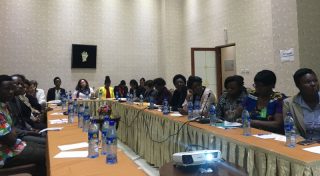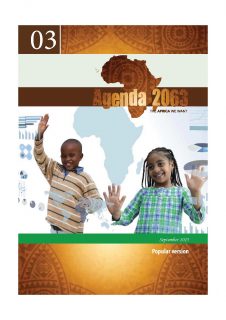
(c) GPE, Emily Laurie
11-07-2017 | Investeren in meer en beter onderwijs, werkgelegenheid, gezondheid en zeggenschap voor jongeren is de sleutel tot ontwikkeling van Afrika. Dat bevestigden de deelnemers aan de 29ste top van de Afrikaanse Unie die van 27 juni-4 juli werd gehouden in Addis Abeba.
Demografisch potentieel
In veel Afrikaanse landen zijn er meer mensen in de leeftijdscategorie van 15-64 jaar, dus van (potentieel) werkenden, dan van de leeftijdscategorieën 0-15 en van 64-plus samen. Dat levert een ‘demografisch dividend’ op: een groot deel van de bevolking kan bijdragen aan economische ontwikkeling en aan het versterken van sociale voorzieningen. Althans, in potentie, want in de praktijk kampen veel mensen uit deze bevolkingsgroep met armoede, honger, gezondheidsproblemen en een gebrek aan opleiding en beroepskansen.
De route naar Africa-2063
Hoe kan de beroepsbevolking (beter) bijdragen aan de ontwikkeling van Afrika? Dat is het belangrijkste vraagstuk waar de Afrikaanse Unie zich in Addis Abeba over boog op de 29ste Africa Union Summit. Regeringsleiders van alle Afrikaanse landen zijn in deze unie verenigd. In 2015 legden ze de Agenda 2063 vast: 7 Aspiraties voor de toekomst van het Afrikaanse continent, vergelijkbaar met de Sustainable Development Goal van de Verenigde Naties. Hoe deze aspiraties kunnen worden behaald, staat beschreven in de Africa Union Roadmap rond het thema van dit jaar: ‘Harnessing the demographic dividend through investments in youth’.
Om het demografisch dividend aan te kunnen wenden voor de ontwikkeling van Afrikaanse landen, zal het vooral lonen om in jongeren te investeren, en dan met name wat betreft:
• Werkgelegenheid en ondernemerschap
• Onderwijs en ontwikkeling van competenties (skills development)
• Gezondheid en welzijn
• Rechten en empowerment
Onderwijs
Gezien de grote rol die onderwijs kan spelen in de Agenda 2063, is het van belang om toegang tot goed onderwijs voor iedereen zeker te stellen en daar voldoende geld voor vrij te maken. Veertig vertegenwoordigers van regeringen, maatschappelijke organisaties en VN-organisaties spraken daarover op de thema-bijeenkomst over onderwijs, die werd georganiseerd door GCE en ANCEFA (Africa Network Campaign on Education for All), met steun van het Global Partnership for Education. Maatschappelijke organisaties drongen er op aan om vooral te letten op belastingen en nationale overheidsbegrotingen.
GCE at the African Union Summit: More and better financing needed to realise education for all and deliver Agenda 2063
GCE, 7 July 2017
Forty representatives and youth ambassadors from civil society, governmental and UN organisations met during the 29th African Union Summit to discuss the achievement of more and better-quality financing for education. Organised by the Global Campaign for Education (GCE) and the Africa Network Campaign on Education For All (ANCEFA), with the support of the Global Partnership for Education (GPE), the meeting discussed how education organisations and civil society can work together to push African leaders to deliver strong political commitments to invest in education – and, importantly, to be held accountable –to ensure all African children are receiving quality, safe education, and that systems are achieving results and strong learning outcomes.
Despite the immense progress that has been made since 2000 in providing children access to school, 264 million children remain out-of-school across the world. 78 million of these children at the primary and lower-secondary level live in GPE partner countries, and nearly 57 million out-of-school children are in Sub-Saharan Africa.
Education is the basic right of every child. It reduces poverty, boosts economic growth and increases income. According to the UNESCO Global Education Monitoring Report, if all students in low-income countries left school with basic reading skills, 171 million people could be lifted out of poverty – the equivalent of a 12% drop in global poverty. Education increases a person’s chances of having a healthy life, reduces maternal deaths, and combats diseases such as HIV and AIDS. Education can promote gender equality, reduce child marriage, and foster peace. A Save the Children study found that every year of schooling decreases the chance of youth engaging in violent conflict by 20%. For all of these reasons education is vital to achieving the 17 Sustainable Development Goals. As GPE’s Victoria Egbetayo, Advocacy and Partnership Specialist emphasised: “Education cannot stand-alone. We want to work with new partners from other sectors.”
The 2017 African Union Summit theme is ‘Harnessing the Demographic Dividend through Investments in Youth’. Provision of equitable and quality education to all is the foundation upon which the continent will yield a demographic dividend, and education is a critical investment to achieving both the Sustainable Development Goals and Agenda 2063. Equally important is the growing recognition of the need to increase financing and investments to expand quality learning opportunities for job creation, social cohesion, and to build strong, resilient, and capable systems. These systems must be responsive to the needs of individual countries/regions, their children and young people, and the continent as a whole. They must equip Africa’s children with the skills needed to respond to the demands of the 21st century economy.
Henry Malumo, GCE’s Education Financing Campaign Manager stated: “We look to the African Union to place financing for education at the centre of its current reforms, which aim to achieve the SDGs and Agenda 2063. Without recognising the importance of education – and the importance of adequately financing education – the realisation of these agendas will remain a distant hope.”
GPE, ANCEFA and GCE all acknowledge the leadership shown by several African governments on financing, notably during the 2014 GPE replenishment, as well as the work of the African Union on investing in youth to unlock the demographic dividend. However, given the centrality of education financing to national budgets and the impact that quality education provision can have on achieving positive outcomes for individuals, communities and countries, there remains an urgent need to do more.
Civil society called on African leaders to:
- Support efforts on national and global tax reforms in order to unlock finance for education through tax justice;
- Spend 20% of their total public expenditure on education, in accordance with the Incheon Declaration, 2015, and to commit to this expenditure at the Global Partnership for Education replenishment summit in early 2018;
- Increased domestic financing should be accompanied by equitable and quality spending of resources to ensure quality education for all by 2030;
- To partner with GPE, as well as GCE and other civil society organisations to develop education sector plans which reach the most marginalised children. Further, to host an AU Summit on education in Africa in 2018, to make detailed commitments to achieving education for all, thus harnessing the demographic dividend;
- The Committee of Heads of State created by the African Union to provide a plan of action supporting the Continental Education Strategy for Africa; and
- To renew their domestic financing commitments to education and pledge to increase public expenditure on education during major global fora in the coming year, including the GPE replenishment conference.
The international community also must step up its commitment to financing education and ensure financing is complementary to and leverages domestic financing, through existing mechanisms like GPE.
The domestic financing message from civil society, youth and other partners who came together as ‘Friends of Education’, as summed up by, Teopista, Birungi, Regional Coordinator at ANCEFA Secretariat, is that “it’s about positive and results based advocacy…so let’s move, let’s push! This is our Africa, let’s make this happen!”
Lees meer
♦ GPE-blog: ‘Partners call on African leaders to commit 20% of their budgets to education’
 Agenda 2063: The Africa We Want
Agenda 2063: The Africa We Want
 Africa Union Roadmap on harnessing the demographic dividend through investments in youth
Africa Union Roadmap on harnessing the demographic dividend through investments in youth
